Related Research Articles

A Touch of Class is a 1973 British romantic comedy film produced and directed by Melvin Frank and starring George Segal, Glenda Jackson, Hildegarde Neil, Paul Sorvino and K Callan. The film tells the story of a couple having an affair, who find themselves falling in love. It was nominated for five Academy Awards, including Best Picture, with Jackson winning Best Actress.

The corpus callosum, also callosal commissure, is a wide, thick nerve tract, consisting of a flat bundle of commissural fibers, beneath the cerebral cortex in the brain. The corpus callosum is only found in placental mammals. It spans part of the longitudinal fissure, connecting the left and right cerebral hemispheres, enabling communication between them. It is the largest white matter structure in the human brain, about ten centimetres in length and consisting of 200–300 million axonal projections.
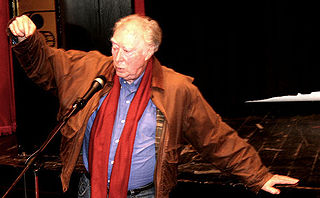
Michael Snow is a Canadian artist working in a range of media including film, installation, sculpture, photography, and music. His best-known films are Wavelength (1967) and La Région Centrale (1971), with the former regarded as a milestone in avant-garde cinema.
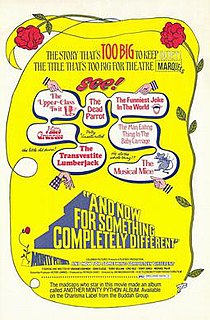
And Now for Something Completely Different is a 1971 British sketch comedy film based on the television comedy series Monty Python's Flying Circus featuring sketches from the show's first two series. The title was taken from a catchphrase used in the television show.

The Last Castle is a 2001 American action drama film directed by Rod Lurie, starring Robert Redford, James Gandolfini, Mark Ruffalo and Delroy Lindo. The film portrays a struggle between inmates and the warden of a military prison, based on the United States Disciplinary Barracks at Fort Leavenworth. A highly decorated U.S. Army Lieutenant General, court martialed and sentenced for insubordination, challenges the prison commandant, a colonel, over his treatment of the prisoners. After mobilizing the inmates, the former general leads an uprising aiming to seize control of the prison.
Corpus Christi is an experimental play by Terrence McNally dramatizing the story of Jesus and the Apostles, ultimately depicting Jesus and the Apostles as gay men living in modern-day Texas. It "follows a group of gay men who re-enact Christ's spiritual journey." Written in 1997 and first staged in New York in 1998, The portrayal of Jesus and the Apostles as gay men focuses Corpus Christi as a play that queers the narrative of Jesus and His Apostles. Corpus Christi is not only unique because of its narrative of Jesus’ life but also because of the way it tells the narrative. McNally arranges the narrative through anachronisms that represent Roman occupation.

Ten Little Indians is a 1965 British crime mystery film directed by George Pollock. It is the second film version of Agatha Christie's 1939 novel. It was produced by Oliver A. Unger, with co-producer Harry Alan Towers also credited as co-writer under his pen name Peter Welbeck.

Joy Ride is a 2001 American road thriller film directed by John Dahl and written by J. J. Abrams and Clay Tarver. Paul Walker stars as Lewis Thomas, a college freshman embarking on a cross-country road trip during summer break to pick up his childhood crush Venna.

Wavelength is a 45-minute film by Canadian experimental filmmaker and artist Michael Snow. Considered a landmark of avant-garde cinema, it was filmed over one week in December 1966 and edited in 1967, and is an example of what film theorist P. Adams Sitney describes as "structural film", calling Snow "the dean of structural filmmakers."

The Adventures of Lolo the Penguin is an animated film from 1986, originally released as a three-part serial film. Its original title and literal translation is The Adventures of Small Penguin Lolo. The film was a co-production between Japan and the Soviet Union.

Darna Zaroori Hai is a 2006 Indian Hindi-language anthology horror thriller film produced by Satish Kaushik, and Ram Gopal Varma. The film is a sequel to Darna Mana Hai. It stars a host of Bollywood actors including Amitabh Bachchan, Anil Kapoor, Sunil Shetty, Riteish Deshmukh, Bipasha Basu, Randeep Hooda, Arjun Rampal, Mallika Sherawat, Sonali Kulkarni, Rajpal Yadav and more. The film was archived at the New York Institute of Technology, as part of the film course.
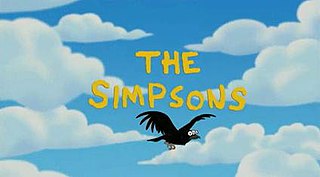
The opening sequence of the American animated television series The Simpsons is among the most popular opening sequences in television. It is accompanied by "The Simpsons Theme", one of television's most recognizable theme songs. The first episode to use this introduction was the series' second episode "Bart the Genius".

Dreams That Money Can Buy is a 1947 experimental feature color film written, produced, and directed by surrealist artist and dada film-theorist Hans Richter.

In Society is a 1944 film starring the comedy team of Abbott and Costello. It was the first of five Abbott and Costello films to be directed by Jean Yarbrough. It was re-released in 1953.
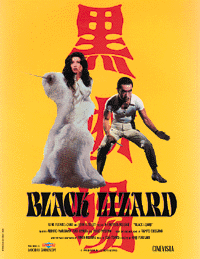
Black Lizard is a 1968 Japanese film directed by Kinji Fukasaku. The film is based on a play by Yukio Mishima which in turn is based on a novel by Rampo Edogawa. The play had previously been adapted to film in 1962 by director Umetsugu Inoue.

Ro.Go.Pa.G. is a 1963 film consisting of four segments, each written and directed by a different director. These include the French director Jean-Luc Godard and the Italian directors Ugo Gregoretti, Pier Paolo Pasolini and Roberto Rossellini.
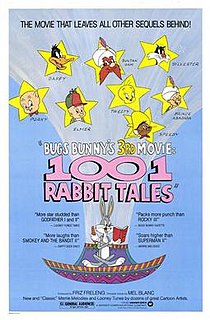
Bugs Bunny's 3rd Movie: 1001 Rabbit Tales is a 1982 animated anthology comedy film directed by Friz Freleng with a compilation of Warner Bros. cartoon shorts and animated bridging sequences, hosted by Bugs Bunny.

Lockout is a 2012 English-language French science fiction action film directed by James Mather and Stephen Saint Leger, and written by Mather, Saint Leger, and Luc Besson. It is both Mather and Saint Leger's feature directorial debuts. The film stars Guy Pearce, Maggie Grace, Vincent Regan, Joe Gilgun, Lennie James and Peter Stormare. The plot follows Snow (Pearce), a man framed for a crime he did not commit, who is offered his freedom in exchange for rescuing the President's daughter Emilie (Grace) from the orbital prison MS One, which has been taken over by its inmates, led by Alex (Regan) and his psychotic brother Hydell (Gilgun).

Batman: Assault on Arkham is a 2014 direct-to-video animated superhero film that is the 20th film of the DC Universe Animated Original Movies. Jay Oliva and Ethan Spaulding direct, with a script by Heath Corson, and James Tucker producing. The film was screened at the 2014 San Diego Comic-Con on July 25, 2014, and it was released digitally on July 29 and on physical media on August 12.
JoAnn Elam was a Chicago-based experimental independent filmmaker. Her films explored socio-political topics, from feminism to working-class struggles. During the 1970's and '80's, Elam became a central figure in the experimental film scene of Chicago. She is best known for the films Rape (1975) and Lie Back and Enjoy It (1982), which can be accredited in part to their continuous distribution from Canyon Cinema. Other notable works include documentaries and short films, such as the unfinished Everyday People (1979–1990). The majority of her work was filmed on small gauge, home movie formats, which she has advocated as political decision because it not only increased intimacy with subjects but was more affordable and accessible, and appropriate for small-scale viewing. In her own words, "Small gauge is not larger than life, it's part of life."
References
- ↑ Peranson, Mark. "Into the Snow Zone". The Village Voice. The Village Voice.
- ↑ Goodard, Peter (8 March 2002). "Snow Falling on Cinema". Toronto Star. ProQuest 438418293.